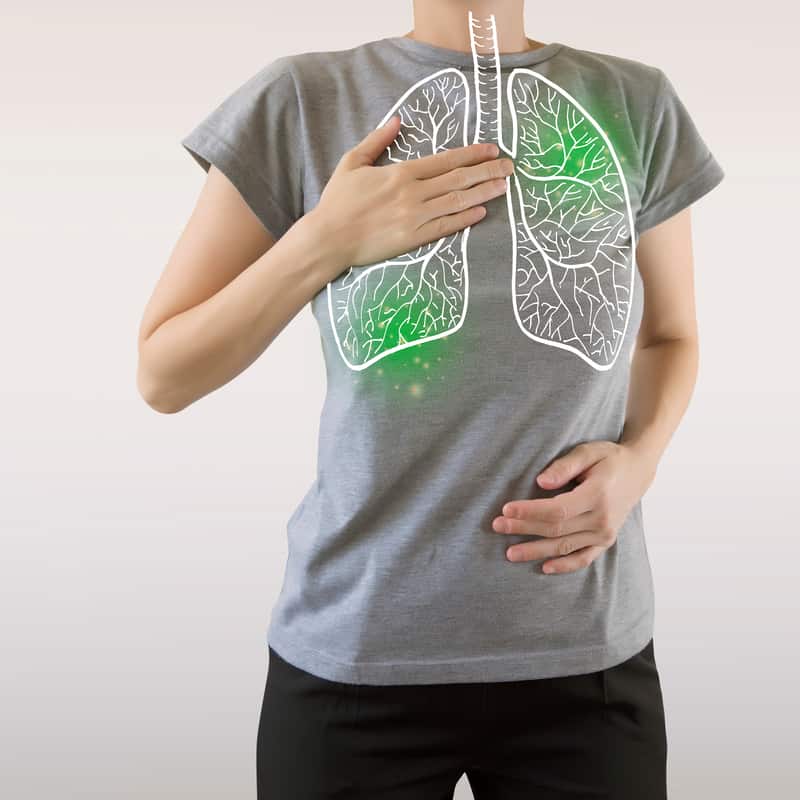10 Easy Ways to Keep Your Lungs Healthy
We don’t often consider the role our lungs play in keeping us strong and well. The truth is that, like the rest of our body, our lungs require daily care and attention to function at their best. It’s only when we experience breathing problems that we begin to appreciate how hard our lungs work for us.
Your lungs allow your body to take in oxygen from the air and clear carbon dioxide (a gas than can become toxic) from your body. This gas exchange is an essential part of breathing, which is a vital function of your life.
When thinking about lung diseases, lung cancer is often the first thought, but there are many other diseases and conditions of the lungs that can be prevented or better managed with these lung health solutions.
Types of Lung Diseases
1. Pneumonia
Pneumonia is a serious lung infection caused by a bacteria or virus that causes a buildup of mucus or fluid that can narrow your airways and reduce airflow in and out of your lungs, making it difficult to breathe. Bacterial pneumonia is the most common form and can be more serious than the other types.
Certain risk factors such as age, environment, lifestyle and medical conditions can increase the risk of pneumonia. In general, infants ages two years old or younger and people who are 65 years old or older tend to be most at risk due to immature and aging immune systems.
Preventing Pneumonia
Hand-washing and avoiding others with respiratory illnesses is an important first step. But another way to protect your lungs is to get the pneumococcal polysaccharide vaccine if your physician recommends it for you.
The CDC recommends the pneumococcal polysaccharide (pneumonia) vaccine for:
- All adults 65 years or older
- People 2 through 64 years old with certain medical conditions
- Adults 19 through 64 years old who smoke cigarettes
2. Asthma
Asthma is a chronic condition that can swell and narrow the airways in the lungs. During an episode, people with asthma often experience symptoms such as wheezing, chest tightness, shortness of breath and coughing.
Asthma affects everyone differently. Some may have mild symptoms while others more severe symptoms that are triggered by more things, more often.
Managing Asthma
Asthma tends to run in families, and while you might not be able to prevent it, you can manage its symptoms by being proactive with an asthma management plan. This often includes partnering with your physician or specialist to control your asthma using a combination of frequent monitoring, avoiding triggers and medications.
3. Chronic Obstructive Pulmonary Disease (COPD)
COPD is a group of progressive lung diseases that damage the airways overtime, which makes breathing more difficult. The most common cause of COPD is smoking or long-term exposure to lung irritants such as air pollution, chemicals or dusts.
Symptoms of COPD include coughing with mucus, wheezing, shortness of breath and chest tightness.
Preventing COPD
Avoiding smoking is the best way to care for your lungs and prevent COPD. If you smoke, talk with your physician about the best and most supportive way to help you stop.
Since other lung irritants can contribute to COPD, such as air pollution, chemical fumes, dusts and secondhand smoke, ensuring that the air quality in your home, school and work environment is healthy can be an important step in protecting your lung health today and in the future.
4. Pulmonary Embolism (PE)
Long periods of inactivity or surgery can cause a blood clot that travels from the leg and blocks a lung artery, which is called a PE. This reduces or prevents blood flow in the small blood vessels of the lungs and can be life threatening if not treated immediately.
Preventing a PE starts with preventing new blood clots. For some, this could mean:
- Knowing when you’re at risk, such as after a surgery or pregnancy, or while taking certain medications
- Taking blood thinners as recommended and frequently monitored by a physician
- Leading a healthy lifestyle that includes regular physical activity, healthy eating and not smoking
- Moving your legs when sitting for long periods of time, such as during a long flight or drive
- Moving as soon as possible after surgery or injury that requires bedrest
10 Tips to Keep Your Lungs Healthy and Strong
If you put your head and heart into taking the best care of your lungs as you can, you’ll breathe a little easier today knowing that you’re protecting your whole health in the future.
Here are 10 everyday tips to keep your lung health it tiptop shape and help prevent lung disease:
- Avoid smoking and secondhand smoke, too
- Be mindful of your environment’s air quality. Test for pollutants or contaminants if you are concerned and discuss it with your doctor
- Prevent common colds and respiratory illnesses by washing your hands frequently with soap and water (or using an alcohol-based hand cleaner if not available)
- Avoid large crowds during the flu season, or when you get wind that some other respiratory illness is going around
- Stay home if you are sick to avoid spreading colds and respiratory illnesses to others
- Get your annual flu shot and encourage others in your household to do the same
- Get regular cardiovascular exercise to boost lung fitness and overall health
- Practice deep breathing, or diaphragmatic breathing, exercises
- Stay on top of your dental health and oral hygiene to prevent harmful bacteria from traveling from your mouth to your upper airway
- Get regular check-ups from your primary care physician and discuss any concerns about your lung health, including any symptoms of lung cancer, and family history of lung disease.
If you’d like more information about how to protect your lung health, our emergency care physicians are here to guide you with expert whole-person care.
Our ER is open 24/7 to help treat and diagnose minor and major emergencies. Our board-certified physicians are available 24 hours.




.jpg)